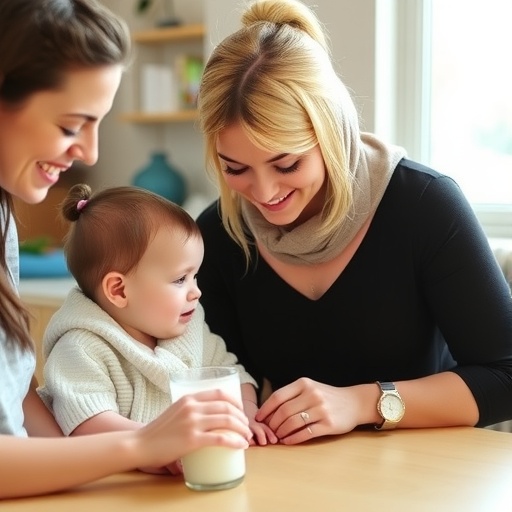In an extensive and demographically varied cohort of first-time mothers across the United States, recent research has unveiled that approximately one out of every twenty-seven participants reported engaging in the sharing of human breast milk with their infants. This prevalence of milk sharing unveils a fascinating, complex, and underreported facet of infant nutrition practices that operates beyond the formal healthcare and commercial milk banking systems. The phenomenon of human milk sharing challenges conventional pediatric paradigms and invites a nuanced appraisal from medical practitioners, particularly within specialties such as pediatrics, family medicine, and nursing.
Prior investigations have elucidated that while many families adopting milk sharing comply with recommended risk mitigation strategies, not all of these measures are universally practiced. This heterogeneity in adherence partly stems from a profound reluctance among families to disclose their milk sharing practices to healthcare providers, often driven by fears of judgment or stigma. Such nondisclosure creates a critical information gap in pediatric care, underscoring the importance of healthcare providers proactively acknowledging and understanding this practice when advising new mothers.
Milk sharing, while historically rooted in communal and cultural traditions, intersects with modern complexities involving virological and bacterial safety concerns. Organizations such as the Academy of Breastfeeding Medicine and the American Academy of Nursing have developed evolving guidelines to support safe milk sharing practices. However, the home pasteurization of shared milk—a pivotal risk reduction strategy currently under scientific scrutiny—remains a subject of ongoing research, with evidence regarding its effectiveness and practical implementation still in development stages.
The detection of milk sharing across diverse demographics in this study prompts a reevaluation of healthcare providers’ roles in preventive education. Pediatricians and family physicians are encouraged not only to inquire nonjudgmentally about milk feeding practices but also to counsel families on potential risks including pathogen transmission, contamination during handling, and storage-related issues. This counseling should integrate current evidence-based recommendations while conveying the evolving nature of guidance on techniques such as Holder pasteurization at a domestic level.
Importantly, the study highlights the dynamic between cultural practices, social trust networks, and medical advice. Milk sharing often occurs within personal or community networks, where trust mitigates concerns about milk safety and origins. However, this trust does not negate objective risks inherent in informal milk exchange, thus necessitating a balanced approach by clinicians that respects familial autonomy while promoting infant health and safety.
Technological advancements in milk screening and pasteurization at the institutional level have significantly reduced risks associated with donor milk in formal milk banks. In contrast, informal milk sharing lacks standardized screening for viruses such as HIV, HTLV, and hepatitis viruses, or for bacterial contamination. The complexity of microbiological risks is compounded by variable storage and handling practices dictated by individual circumstances. These variables contribute to an opaque milieu surrounding the informally shared milk’s hygienic and nutritional integrity.
Moreover, the maternal motivations behind milk sharing are multifaceted, encompassing lactation insufficiency, premature infant nutrition, and cultural or ethical beliefs favoring human milk over formula. This diversity of motivations adds layers of sociological and biomedical considerations to the clinical implications of milk sharing. These factors illustrate the necessity of integrating social science perspectives such as demography and family studies into medical discourse for a holistic understanding of this practice.
The reluctance to share milk sharing practices with healthcare providers impairs opportunities for tailored, preventive guidance. Thus, developing confidential and supportive communication channels within clinical encounters emerges as a priority. Such an approach may enhance transparent dialogue, ultimately improving infant feeding outcomes and minimizing unintentional exposure to risk.
This emergent understanding of milk sharing prevalence also intersects with broader public health concerns relating to maternal and infant health disparities among different populations in the United States. The intricate relationship between socioeconomic status, education level, and access to formal milk donation infrastructure likely influences milk sharing behaviors, suggesting that equitable healthcare delivery must encompass culturally competent breastfeeding support and education.
In addressing risk, practitioners must also consider the current landscape of breastfeeding promotion and support. Effective lactation consultancy and family medicine interventions aimed at increasing exclusive breastfeeding rates may concurrently influence the prevalence and safety of milk sharing. Thus, the continuum of breastfeeding support from prenatal education through postpartum care forms an essential backdrop for contextualizing informal milk feeding practices.
Continuing research is warranted to elucidate the microbiological safety of various risk reduction methods within home-based milk sharing. Future studies leveraging rigorous epidemiological methods and advanced virological assays can inform updated clinical guidelines. Concurrently, ethical inquiries into informed consent, confidentiality, and parental autonomy must shape the policy framework governing milk sharing.
In conclusion, the recognition that informal human milk sharing occurs across diverse U.S. populations compels a paradigm shift in pediatric counseling and public health strategies. By integrating evolving scientific evidence with empathetic clinical communication, healthcare providers can better support families navigating infant feeding decisions involving shared human milk, optimizing health outcomes while respecting individual values and social networks.
Subject of Research: Informal human milk sharing among first-time mothers in the United States and associated risk mitigation practices.
Article Title: Not provided.
News Publication Date: Not provided.
Web References: (doi:10.1001/jamanetworkopen.2025.42036)
References: Not provided.
Image Credits: Not provided.
Keywords: Milk, Breastfeeding, Mothers, United States population, Pediatrics, Risk reduction, Family, Family medicine, Demography, Population studies, Nursing




